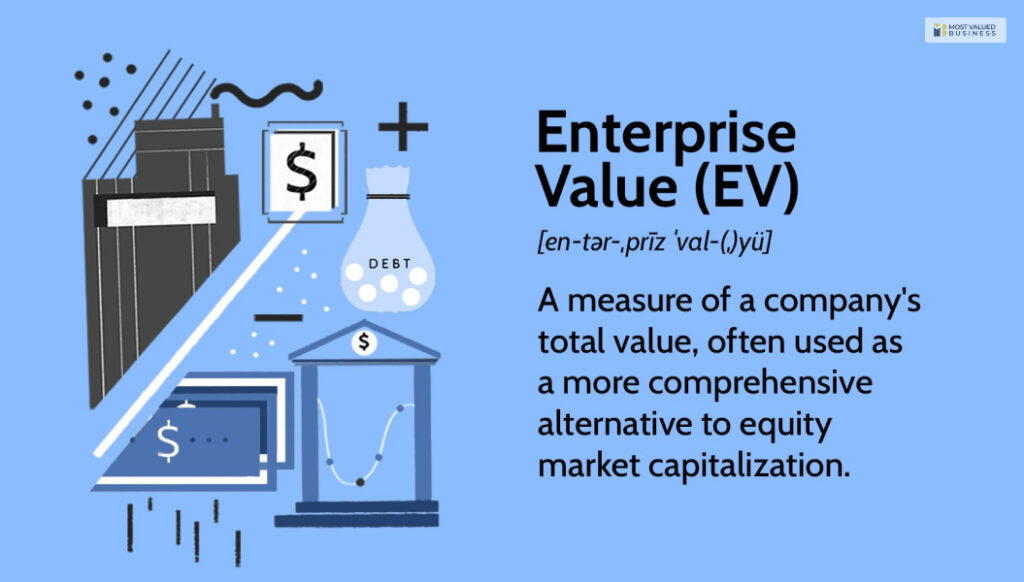Using An Enterprise Value: All That You Need To Know
You would often see people discussing ‘stock prices’ or how it has gone up or down. Even though stock prices are important in their own respect, it rarely provides us with a bigger picture. Therefore, along with stock prices, you also need other data to support your research. This is where enterprise value comes into the picture.
With the current financial situation, one needs to know exactly what or how much a company is valued in a market, and an enterprise value of a company is the most effective way of knowing that. This market knowledge can give you a lay of the land and, in turn, would enable you to make a more informed decision. However, do not worry, as we are here to guide you through understanding what enterprise value is or how enterprise value is calculated.
This complete guide is aimed towards individuals who have a general knack for understanding business or want to sell their company to start some new business venture. It does not matter how much you know about the technical terms; we are here to help you through the process. Let’s go!
What Is An Enterprise Value?

To put it simply, enterprise value is the measure of a company’s total value. It provides an individual with the scale of the said business. It does not just look at the overall equity value of a company. Rather, it factors in the market capitalization of a company, along with long- and short-term debts. It also factors in cash or any cash equivalents the company has in its calculation. Therefore, it tries to provide a more comprehensive look at the whole business from a financial point of view. It can also help an individual to understand how a company is faring in the whole market scenario.
Theoretically, enterprise value gives you a realistic look at the ballpark amount an investor has to invest while acquiring a company that has gone public. However, there are other factors that also play crucial roles. These factors include deal premium, supply/demand, and competitive bidding. All these factors collectively contribute to making a deal successful.
Read More: 6 Essential Financial Decisions You Should Be Thinking About Right Now
Why Is Enterprise Value Used?

Enterprise value is used primarily for multiples like EV/EBITDA, EV/EBIT, EV/FCF, or EV/Sales. This helps in providing a better comparative analysis as it factors in a lot of elements that other analyses do not. Like for example, P/E ratio usually negates or does not factor in terms like cash and debt into account, unlike enterprise value.
Enterprise value is especially useful in situations that include mergers and acquisitions. It is also useful for comparing companies that fall within different capital structures. It helps an individual to track any sort of change in the respected capital structure by monitoring the overall enterprise value.
Formula And Calculations:
Before knowing how to calculate enterprise value, you just need to know more about some of the key concepts that can help you with the calculation:
- Market Capitalization (MC): total value of a company’s outstanding as well as the preferred shares.
- Debt (D): The amount of money the company owes to other organizations or to the market in general.
- Cash Or Cash Equivalents (C): The total amount of cash, drafts, certificates of deposit, commercial paper, money orders, money market funds, marketable securities, short-term government bonds, or Treasury bills a company possesses
- Minority interest (MI): Subsidiaries that own less than 50% of a company. It can be added to MC for the calculation of enterprise value.
- Unfunded Pension Liabilities (UPL): The outstanding amount a company has to pay to make pension payouts. Again, this value can be added to the MC for enterprise value calculation.
Now that you know the key terms, let us look at how to calculate enterprise value. The general formula for enterprise value calculation is:
| Enterprise value=(MC+D)−C |
Let us assume a company’s total cash or cash equivalent (C) is $200,000; total debt (D) is $290,000; and finally, the market capitalization (MC) is $21,850. Therefore, by putting the numbers according to the formula, we will see:
Enterprise Value= (21,850+290,000)-200,000
Therefore, the company’s enterprise value= $111,850.
What Are The Limitations?

Now, even though enterprise value is an effective tool for establishing the overall value of a company, it is still not foolproof. There are certain limitations that you need to know before moving ahead.
The primary limitation of enterprise valuation becomes most apparent when comparing two dissimilar companies or companies that are at different stages of growth. It tends to classify all the companies in a singular spectrum without taking their differences into consideration.
Moreover, enterprise valuation fails to explain how a company makes use of its debts. Like for example, a successful software company with low cash reserve and significant debt would score less than a mediocre performing soft-drink company with a reversed situation. Therefore, you need to be wary when comparing dissimilar companies.
Frequently Asked Question !! (FAQ) :
Ans: Enterprise value gives us an idea of the total value of a company. Meanwhile, market value is effective in giving us an idea about the company’s share and stock prices.
Ans: Enterprise value gives us an idea about the total valuation of a company. Meanwhile, analysis like EV/EBITDA is a better indicator of the total value of the overall earning of a company. An EV/EBITDA score under 10 is a good sign.
Read More: SMB Business – Let’s Discuss 6 Important Characteristics
Final Thought
In summation, enterprise value is a dynamic way of calculating the overall valuation of a company. This is a method that is usually employed by other companies during the process of mergers and acquisitions. Moreover, it is also useful for an investor who wants to assess the overall value of a company and evaluate the overall stock prices of the company. However, if you are an investor, we would definitely suggest you not stick to a singular method of evaluating your company. A varied approach would help you make your assessment more accurate or precise. This, in turn, would help you to make more informed business decisions. Ciao!
Read Also:



